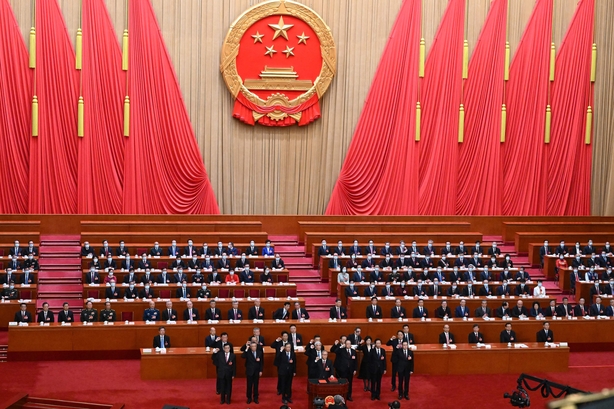Xi Jinping was handed a third term as Chinese president, capping a rise that has seen him become the country's most powerful leader in generations.
The appointment by China's rubber-stamp parliament comes after Mr Xi locked in another five years as head of the Chinese Communist Party (CCP) in October.
Since then, the 69-year-old has weathered widespread protests over his zero-Covid policy and the deaths of countless people after its abandonment.
Those issues have been avoided at this week's National People's Congress (NPC), a carefully choreographed event that is also set to appoint Xi ally Li Qiang as the new premier.
Delegates today handed Mr Xi a third term as China's president and re-elected him as head of the country's Central Military Commission in a unanimous vote.
His re-election is the culmination of a remarkable rise in which he has gone from a relatively little-known party apparatchik to the leader of a rising global power.
His coronation sets him up to become communist China's longest-serving president, and means Mr Xi could rule well into his 70s - if no challenger emerges.
"In his third term, Xi will need to focus on economic revival," said Willy Lam, senior fellow at the Jamestown Foundation, a US think tank.
"But if he continues with what he has been doing - tighter party and state control over the private sector and confrontation with the West, his prospects for success won't be encouraging."
During the voting, Mr Xi chatted casually with premier-in-waiting Li Qiang, who was seated to his left and is poised to be confirmed tomorrow to China's No 2 position, a role that puts the former Shanghai party chief and close Xi ally in charge of managing the economy.
Other Xi-approved officials will also be elected or appointed to key government posts during the upcoming weekend, including vice premiers, a central bank governor and numerous other ministers and department heads.

The annual parliamentary session, the first since China dropped three years of Covid restrictions, will end on Monday, when Mr Xi will give a speech that will be followed by a media question-and-answer session by Li.
For decades, China - scarred by the dictatorial reign and cult of personality of founding leader Mao Zedong - eschewed one-man rule in favour of a more consensus-based, but still autocratic, leadership.
That model imposed term limits on the largely ceremonial role of the presidency, with Mr Xi's predecessors Jiang Zemin and Hu Jintao relinquishing power after ten years in office.
Mr Xi has torn up that rulebook, abolishing term limits in 2018 and allowing a cult of personality to foster his all-powerful leadership.
But the beginning of his unprecedented third term comes as the world's second-largest economy faces major headwinds, from slowing growth and a troubled real estate sector to a declining birth rate.
Relations with the United States are also at a low not seen in decades, with the powers sparring over everything from human rights to trade and technology.
"We will see a China more assertive on the global stage, insisting its narrative to be accepted," Steve Tsang, director of the SOAS China Institute, told AFP.
"But it is also one that will focus on domestically making it less dependent on the rest of the world, and making the Communist Party the centrepiece of governance, rather than the Chinese government," he said.
"It is not a return to the Maoist era, but one that Maoists will feel comfortable in," Mr Tsang added.
"Not a direction of travel that is good for the rest of the world."
Russian President Vladimir Putin has congratulated Mr Xi, hailing the strengthening ties between the two countries.
"Dear friend, please accept sincere congratulations," Mr Putin said in a statement released by the Kremlin.
"Russia highly values your personal contribution toward the strengthening of ties... and strategic cooperation between our nations."

